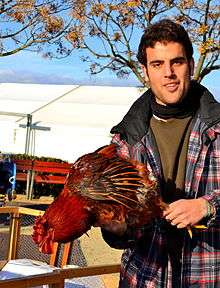Penedesenca
 Penedesenca cock in the Fira del Gall market of Vilafranca del Penedès | |
| Country of origin | Spain |
|---|---|
| Distribution | Catalonia |
| Use | eggs |
| Traits | |
| Weight | Male: 2.3–3 kg[1] |
| Female: 1.7–2.3 kg[1] | |
| Egg color | dark reddish-brown |
| Comb type | clavell (carnation) |
| Classification | |
| PCGB | rare soft feather: heavy[2] |
|
Chicken Gallus gallus domesticus | |
The Penedesenca is a breed of chicken originating in the Spanish region of Catalonia, in the area around Vilafranca del Penedès, the main town of the historical Penedès region. It was developed in the first half of the 20th century from native barnyard chickens, and today is noted for its dark brown eggs, said to be among the darkest of any breed of chicken.
History
It is not known for how long country people in Catalonia have raised chickens that laid dark brown eggs. The first documentation of them is from 1928, when attempts were made to avert the extinction of the type. In 1932 selection of a black type was begun by a group of breeders in a town near Vilafranca del Penedès. A breed standard for this black Penedesenca was approved in 1946, with the name "Villafranquina Negra", or black Vilafranca chicken.[1]
Characteristics
Today, Black, Crele, Partridge, and Wheaten colors exist (the Crele variety shows sexual differentiation at hatching, the males being light ash-grey and the females nut-brown in color). However, no variety has been accepted into poultry standards. All members of the breed possess red earlobes with a white center, red wattles, and an unusual red comb. Called the king's comb or carnation comb, it is similar to a common single comb but has several lobes at the rear.
References
- 1 2 3 Miguel Fernández Rodríguez, Mariano Gómez Fernández, Juan Vicente Delgado Bermejo, Silvia Adán Belmonte, Miguel Jiménez Cabras (eds.) (2009). Guía de campo de las razas autóctonas españolas (in Spanish). Madrid: Ministerio de Medio Ambiente y Medio Rural y Marino. ISBN 9788449109461. p. 669–73.
- ↑ Breed Classification. Poultry Club of Great Britain. Accessed August 2014.
- Ekarius, Carol (2007). Storey's Illustrated Guide to Poultry Breeds. 210 MAS MoCA Way, North Adams MA 01247: Storey Publishing. ISBN 978-1-58017-667-5.